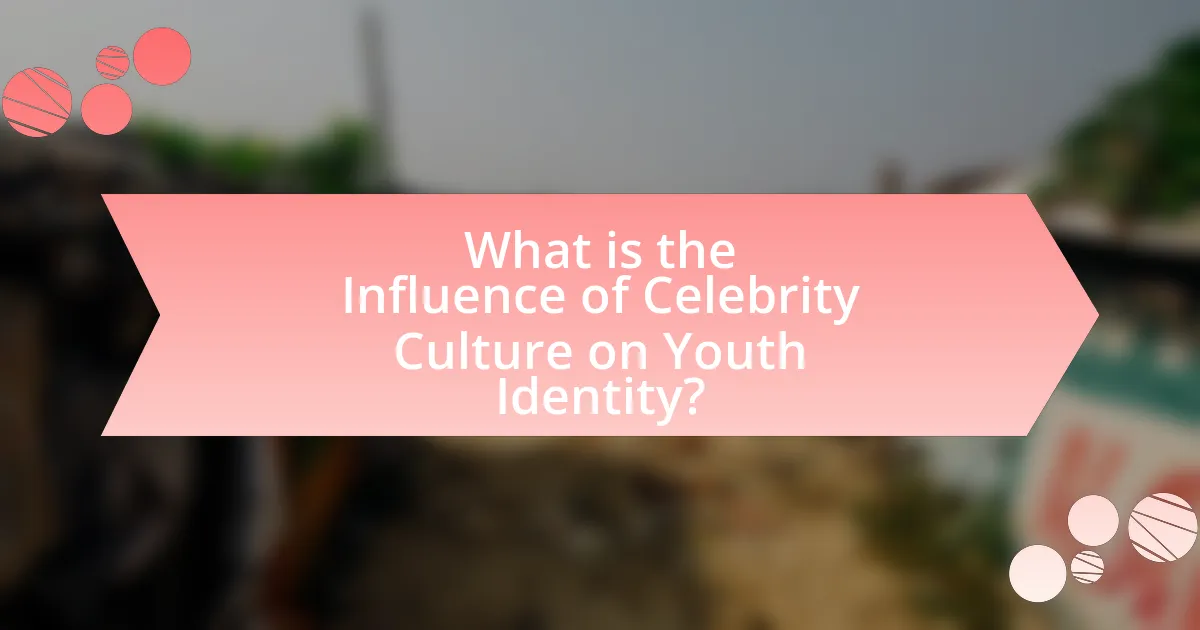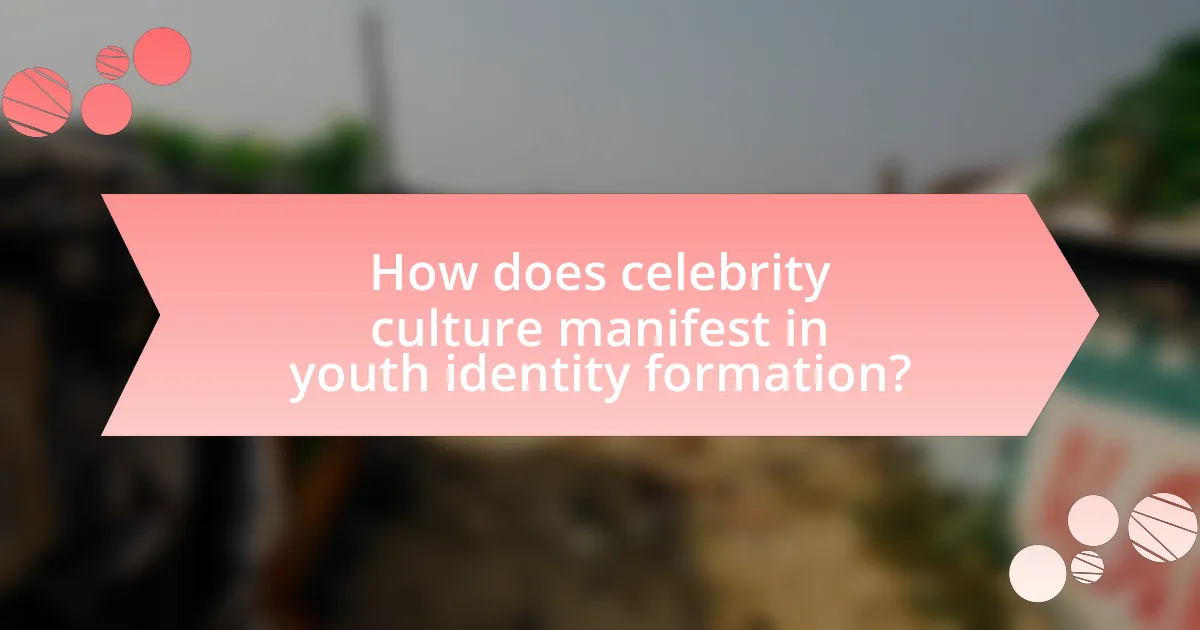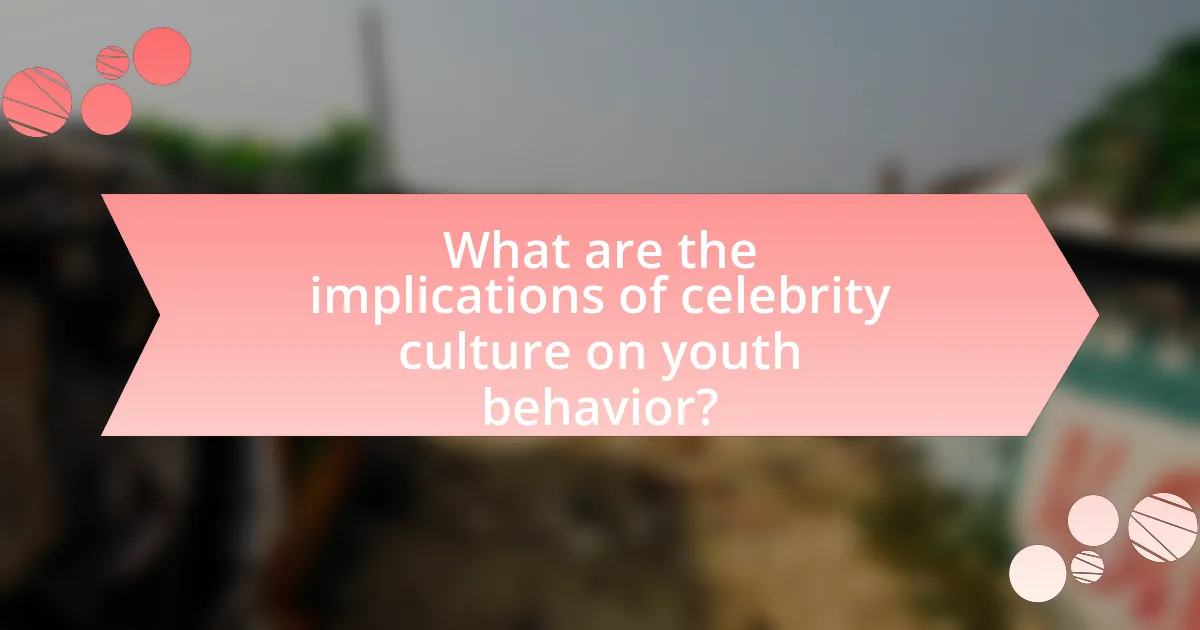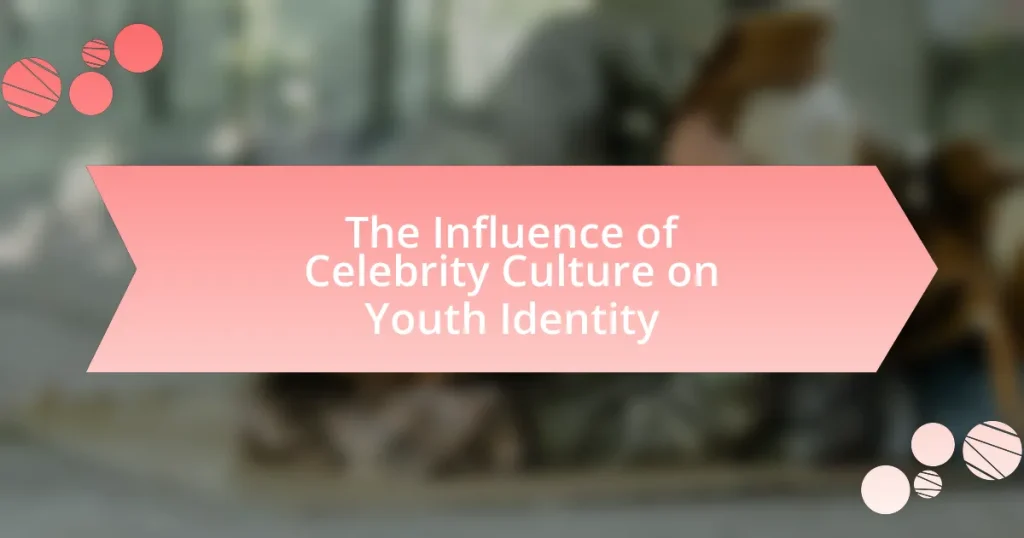The article examines the significant influence of celebrity culture on youth identity, highlighting how it shapes values, aspirations, and self-perception. It discusses the role of social media in amplifying this influence, leading to both positive and negative outcomes, such as increased materialism and body image concerns. The article also explores how different demographics experience celebrity culture, the psychological effects on self-esteem, and the implications for youth behavior and decision-making. Additionally, it offers strategies for mitigating negative influences and resources to help youth navigate celebrity culture positively.

What is the Influence of Celebrity Culture on Youth Identity?
Celebrity culture significantly influences youth identity by shaping their values, aspirations, and self-perception. Young individuals often emulate celebrities, adopting their fashion choices, behaviors, and lifestyles, which can lead to a distorted sense of self-worth based on external validation. Research indicates that exposure to celebrity culture correlates with increased materialism and body image concerns among youth, as they strive to meet the often unrealistic standards set by public figures. For instance, a study published in the Journal of Youth and Adolescence found that adolescents who frequently engage with celebrity content are more likely to experience lower self-esteem and higher levels of anxiety related to their appearance. This demonstrates that celebrity culture plays a crucial role in forming youth identity, influencing how they view themselves and their place in society.
How does celebrity culture shape the perceptions of youth?
Celebrity culture significantly shapes the perceptions of youth by establishing ideals of beauty, success, and lifestyle that young people often aspire to emulate. This influence is evident in the way social media platforms amplify celebrity lifestyles, leading to increased pressure on youth to conform to these standards. Research indicates that exposure to celebrity images can lead to body dissatisfaction and altered self-esteem among adolescents, as they compare themselves to the often unrealistic portrayals of celebrities. A study published in the journal “Body Image” found that young individuals who frequently engage with celebrity content are more likely to develop negative body image perceptions, highlighting the direct impact of celebrity culture on youth identity formation.
What role do social media platforms play in this influence?
Social media platforms significantly amplify the influence of celebrity culture on youth identity by providing immediate access to celebrity content and interactions. These platforms, such as Instagram and TikTok, enable celebrities to share their lifestyles, opinions, and personal brands directly with millions of followers, shaping youth perceptions and aspirations. Research indicates that 70% of teenagers feel more connected to celebrities through social media, which can lead to the adoption of similar behaviors and values. This direct engagement fosters a sense of relatability and aspiration, reinforcing the impact of celebrity culture on youth identity formation.
How do celebrities serve as role models for young people?
Celebrities serve as role models for young people by influencing their behaviors, aspirations, and values. Through their public personas, celebrities often embody traits such as success, resilience, and creativity, which young individuals may aspire to emulate. For instance, research by the Pew Research Center indicates that 54% of teens look up to celebrities for inspiration in their personal lives, highlighting the significant impact these figures have on youth identity formation. Additionally, celebrities often engage in philanthropic efforts, promoting social causes that resonate with young audiences, thereby encouraging them to participate in community service and activism. This combination of aspirational qualities and social engagement reinforces the role of celebrities as influential figures in shaping the values and behaviors of young people.
Why is understanding this influence important for society?
Understanding the influence of celebrity culture on youth identity is crucial for society because it shapes the values, behaviors, and self-perceptions of young individuals. This influence can lead to both positive and negative outcomes; for instance, celebrities often serve as role models, promoting social causes and inspiring youth to engage in activism. However, research indicates that excessive idolization of celebrities can result in unrealistic standards of beauty and success, contributing to issues such as low self-esteem and mental health challenges among adolescents. A study published in the Journal of Youth and Adolescence found that exposure to idealized images of celebrities correlates with body dissatisfaction and disordered eating behaviors in young people. Therefore, understanding this influence allows society to foster healthier role models and mitigate the adverse effects of celebrity culture on youth identity.
What are the potential positive impacts of celebrity culture on youth identity?
Celebrity culture can positively impact youth identity by providing role models and fostering self-expression. Young individuals often look up to celebrities for inspiration, which can motivate them to pursue their passions and develop their own identities. For instance, celebrities who advocate for social causes can encourage youth to engage in activism and community service, promoting a sense of purpose and belonging. Additionally, the diverse representation seen in celebrity culture can help marginalized youth feel validated and accepted, contributing to their self-esteem and confidence. Research indicates that exposure to positive celebrity figures can enhance youth’s aspirations and encourage them to embrace their uniqueness, ultimately shaping a more inclusive and empowered identity.
What are the negative consequences associated with celebrity influence?
Celebrity influence can lead to negative consequences such as the promotion of unrealistic body standards, materialism, and unhealthy behaviors among youth. Research indicates that exposure to idealized images of celebrities can result in body dissatisfaction and eating disorders, as evidenced by a study published in the journal “Body Image,” which found that young women exposed to thin-ideal media reported higher levels of body dissatisfaction. Additionally, celebrity endorsements often glamorize excessive consumption and a lifestyle centered around wealth, which can foster materialistic values in impressionable youth. Furthermore, celebrities who engage in risky behaviors, such as substance abuse, can inadvertently normalize these actions, leading to increased experimentation among young fans.

How does celebrity culture manifest in youth identity formation?
Celebrity culture significantly influences youth identity formation by shaping values, aspirations, and self-perception. Young individuals often emulate celebrities, adopting their styles, behaviors, and attitudes as a means of self-expression and identity construction. Research indicates that exposure to celebrity lifestyles can lead to the internalization of specific ideals, such as beauty standards and success metrics, which are often unrealistic. For instance, a study published in the Journal of Youth Studies found that adolescents who frequently engage with celebrity content are more likely to experience body dissatisfaction and lower self-esteem, as they compare themselves to idealized images presented by celebrities. This phenomenon illustrates how celebrity culture not only impacts individual identity but also reinforces societal norms and expectations among youth.
What are the key factors that contribute to this manifestation?
The key factors that contribute to the manifestation of celebrity culture’s influence on youth identity include social media exposure, aspirational consumption, and peer validation. Social media platforms like Instagram and TikTok amplify celebrity visibility, allowing youth to engage with and emulate their lifestyles. This constant exposure fosters a desire for aspirational consumption, where young individuals seek to acquire products and lifestyles associated with their favorite celebrities. Additionally, peer validation plays a crucial role, as youth often seek approval from their social circles, reinforcing the importance of celebrity influence in shaping their identities. Research by the American Psychological Association indicates that adolescents are particularly susceptible to social comparison, which further solidifies the impact of celebrity culture on their self-perception and identity formation.
How do fashion and lifestyle choices reflect celebrity influence?
Fashion and lifestyle choices reflect celebrity influence through the adoption of trends popularized by public figures, which significantly shape consumer behavior and identity formation among youth. Celebrities often serve as trendsetters, with their clothing, accessories, and lifestyle habits being emulated by fans, leading to a direct correlation between celebrity endorsements and increased sales in fashion brands. For instance, a study by the Journal of Consumer Research found that when celebrities endorse products, there is a notable spike in consumer interest and purchasing behavior, particularly among younger demographics. This demonstrates how celebrity culture not only impacts individual choices but also reinforces societal norms and aspirations related to identity and self-expression.
What psychological effects does celebrity culture have on youth self-esteem?
Celebrity culture negatively impacts youth self-esteem by fostering unrealistic standards of beauty and success. Young individuals often compare themselves to idealized images of celebrities, leading to feelings of inadequacy and low self-worth. Research indicates that exposure to celebrity culture correlates with increased body dissatisfaction and depressive symptoms among adolescents. A study published in the journal “Body Image” found that adolescents who frequently consume celebrity media report lower self-esteem and higher levels of anxiety related to their appearance. This suggests that the pervasive nature of celebrity culture can significantly undermine the self-esteem of youth.
How do different demographics experience celebrity culture?
Different demographics experience celebrity culture in varied ways influenced by factors such as age, gender, socioeconomic status, and cultural background. For instance, younger audiences, particularly teenagers, often idolize celebrities as role models, shaping their identity and aspirations, as evidenced by a study from the Pew Research Center which found that 70% of teens feel that celebrities influence their fashion choices and lifestyle decisions. In contrast, older demographics may engage with celebrity culture more critically, often focusing on the societal implications of celebrity actions rather than personal admiration. Additionally, cultural background plays a significant role; for example, individuals from collectivist cultures may view celebrity status through the lens of community values, while those from individualistic cultures may prioritize personal achievement and fame. This multifaceted engagement highlights how demographic factors shape the perception and impact of celebrity culture across different groups.
What differences exist between urban and rural youth in relation to celebrity influence?
Urban youth are generally more influenced by celebrity culture than rural youth due to greater access to media and social platforms. Urban areas typically have higher exposure to diverse forms of entertainment, including television, movies, and social media, which amplifies the presence of celebrities in daily life. In contrast, rural youth may have limited access to such media, resulting in less frequent engagement with celebrity culture. Studies indicate that urban youth are more likely to emulate celebrity behaviors and fashion trends, as they are often surrounded by peers who share similar interests and access to information. Conversely, rural youth may prioritize local role models and community figures, leading to different identity formation processes influenced by their immediate environment rather than celebrity culture.
How do cultural backgrounds affect the perception of celebrities among youth?
Cultural backgrounds significantly influence how youth perceive celebrities, shaping their values, aspirations, and identity. For instance, youth from collectivist cultures may prioritize celebrities who embody community values and social responsibility, while those from individualistic cultures might admire celebrities for personal achievements and self-expression. Research by the Pew Research Center indicates that cultural context affects media consumption patterns, with diverse backgrounds leading to varied celebrity role models and influences. This variation highlights how cultural narratives and societal norms inform youth’s admiration and critique of public figures, ultimately impacting their self-concept and social interactions.

What are the implications of celebrity culture on youth behavior?
Celebrity culture significantly influences youth behavior by shaping their values, aspirations, and social interactions. Young individuals often emulate celebrities, adopting their fashion choices, lifestyles, and attitudes, which can lead to a distorted sense of self-worth based on external validation. Research indicates that exposure to celebrity culture correlates with increased materialism and body image concerns among adolescents. For instance, a study published in the journal “Psychology of Popular Media Culture” found that adolescents who frequently engage with celebrity content are more likely to experience dissatisfaction with their own bodies and pursue unrealistic beauty standards. This influence can also manifest in behaviors such as substance use and risky activities, as youth may seek to replicate the perceived glamorous lifestyles of celebrities.
How does celebrity culture affect youth decision-making?
Celebrity culture significantly influences youth decision-making by shaping their values, aspirations, and behaviors. Young individuals often emulate celebrities, adopting their fashion choices, lifestyle habits, and even opinions, which can lead to decisions that prioritize popularity and social acceptance over personal values. Research indicates that exposure to celebrity endorsements can sway youth purchasing decisions, with a study by the American Psychological Association revealing that adolescents are more likely to buy products endorsed by celebrities they admire. This influence extends to areas such as career aspirations, where youth may pursue paths aligned with celebrity lifestyles rather than their own interests or skills.
What impact does celebrity endorsement have on youth consumer behavior?
Celebrity endorsement significantly influences youth consumer behavior by enhancing brand appeal and driving purchasing decisions. Research indicates that young consumers are more likely to trust and identify with brands endorsed by celebrities, as they often perceive these figures as relatable and aspirational. A study published in the Journal of Advertising Research found that 70% of adolescents reported being influenced by celebrity endorsements when making purchasing choices, highlighting the effectiveness of this marketing strategy. This impact is further amplified by social media, where celebrities engage directly with youth, creating a sense of community and loyalty towards endorsed products.
How do youth engage in risk-taking behaviors influenced by celebrities?
Youth engage in risk-taking behaviors influenced by celebrities primarily through imitation and social validation. When celebrities publicly engage in risky activities, such as substance use or reckless behavior, young fans often perceive these actions as glamorous or desirable. Research indicates that adolescents are particularly susceptible to celebrity influence due to their developmental stage, where peer acceptance and identity formation are critical. For instance, a study published in the Journal of Youth and Adolescence found that exposure to celebrity behaviors correlates with increased likelihood of engaging in similar risk-taking activities, highlighting the role of social media in amplifying these influences.
What strategies can be employed to mitigate negative influences?
To mitigate negative influences from celebrity culture on youth identity, strategies such as promoting critical media literacy, fostering positive role models, and encouraging open discussions about values can be employed. Critical media literacy equips youth with the skills to analyze and question the messages conveyed by celebrities, reducing the likelihood of adopting harmful behaviors. Research indicates that when young people engage in discussions about media content, they develop a more nuanced understanding of celebrity portrayals, which can counteract negative influences. Additionally, introducing positive role models who embody healthy values can provide alternatives to the often unrealistic standards set by celebrities. Programs that facilitate open discussions about personal values and self-esteem can further empower youth to resist negative influences, as evidenced by studies showing that supportive environments enhance resilience against peer pressure and media impact.
How can parents and educators foster critical thinking about celebrity culture?
Parents and educators can foster critical thinking about celebrity culture by encouraging discussions that analyze the motivations behind celebrity actions and the impact of media representation. Engaging youth in conversations about the authenticity of celebrity personas and the societal values they promote helps develop analytical skills. Research indicates that critical media literacy programs, which include examining celebrity culture, can enhance students’ ability to critically assess media messages (Hobbs, 2010). By integrating these discussions into curricula and family dialogues, parents and educators can empower youth to question and understand the complexities of celebrity influence on identity.
What resources are available to help youth navigate celebrity influence positively?
Resources available to help youth navigate celebrity influence positively include educational programs, online platforms, and community initiatives. Educational programs, such as media literacy courses, teach young people critical thinking skills to analyze celebrity culture and its impact on their self-image. Online platforms like Common Sense Media provide reviews and resources that help youth understand the implications of celebrity influence on social media. Community initiatives, such as mentorship programs, connect youth with role models who promote positive values and healthy self-esteem, countering negative celebrity influences. These resources collectively empower youth to make informed choices regarding celebrity culture and its effects on their identity.
